Plot introduction
The story takes place in 1998. The Cold War has continued for about 50 years. America is in a state of constant readiness for nuclear attack. Shelter drills are an everyday occurrence. They are accompanied by military exercises which rehearse destroying attacking aircraft and missiles. Despite this, life goes on as it always has. People gripe about the drills, but would far rather talk about political issues or, better yet, baseball.
The lives of three people, a newly minted civil engineering graduate, a statistician and a magazine editor, intersect. This starts a chain reaction which leads to the overturning of the status quo.
An important character in the story is the President of the United States. A former New Jersey accountant, state senator and Governor, who nonetheless thinks of himself as a "hard riding, hard drinking Southern gentleman", he is a front for an army of advisers and fixers who tell him what to say through a wireless earphone. He leads the "Middle Roaders", apparently a Republican faction. The opposition are the "Nationalists" who favor a sudden first strike, or "sneak punch" against the Communists. The Democratic party is despised, being routinely referred to as the "Party of Treason".
The burning political issue in Congress and the nation is the "Civilian Shelters Bill", or "C.S.B.", a plan to build deep air-raid shelters capable of housing the entire nation. So disconnected is the President that he knows nothing about this. The other obsession, the Baseball All-Star Game, is something he knows all about, and is looking forward to watching. This is the man who, at the end of the story, has to pick up the pieces and move the nation forward.
Plot summary
Walter Chase, a fresh graduate of Civil Engineering from "Eastern University", is a man on the make. Having been skillfully steered into his education with the promise of a guaranteed job on the Shelter programs to come, he regards all the people he meets as potential stepping stones on his way up the ladder. Those who do not look like good prospects he efficiently discards, an example being his college girlfriend whose father is only a passed-over Federal bureaucrat. Leaving college behind, he heads towards his destiny, the first stop being the staff of Senator David Horton, of Indiana, a passionate and slightly unstable advocate of the Civilian Shelters Bill.
Arturo Denzer, whom we first encounter bracing himself to face the day with the aid of vitamins, aspirin, thyroid extract, caffeine, nicotine and amphetamine, is ironically the editor of Nature's Way Magazine, specializing in reviews of "natural" food products. Getting to work is a matter of negotiating robotic elevators and taxis, all of whom attempt to draw him into unwanted conversations about the All-Star Game and the Civilian Shelters Bill. The worst is the taxi, which being a "Black and White hack", addresses him as "Mac". Arriving at his office in Washington D.C., he finds that a crucial lab report is missing, so he and his assistant, Maggie Frome, have to personally travel to the labs to collect it. On the way, they stop the taxi bothering them by pretending to be lovers "making out" in the back seat. The taxis are programmed simply to wink and chuckle at this. In reality they are discussing the upcoming edition of the magazine.
At the Nature's Way labs Arturo Denzer and Maggie Frome encounter the scientist Valendora, who prepared the report they came to collect. Valendora is disgusted when his boss at the lab decides that certain harmful side-effects of the product, Aztec Cocawine, can be overlooked. At this point an air-raid drill throws everything into confusion. Denzer and Maggie have to spend time in the shelter where everyone around them wants to discuss, as loudly as possible, the upcoming All-Star Game or the C.S.B. Frustrated beyond measure, Maggie yells at those near her to shut up, uttering the rude "P-word" (politics), much to Denzer's dismay.
President Braden appears at the daily White House press briefing, where it becomes apparent that he simply parrots what he hears in his earphone. The assembled correspondents likewise pretend that he is talking "off the cuff". Asked about C.S.B. the President delivers a formulaic speech about moving it forward, even though he knows nothing about it. He then has a meeting with Senator Horton, who almost has a meltdown in the Oval Office, so frustrated is he with the lack of progress of the bill. After Horton leaves, Braden tries to find out about C.S.B., only to be told by Senator Jim Harkness, who chairs the committee Horton sits on, that the whole thing is just an issue that has to be kept on the boil for as long as possible, there being no other significant political issues to use as a platform for re-election. Harkness is contemptuous of Horton, regarding him as a makeweight on the committee and a loose cannon politically. He recommends that the President "put some money" in Horton's district before the next election.
Emerging from the air-raid shelter, Denzer and Maggie are arrested because they are not wearing mandatory dosimeters. Tossed into a holding cell with other miscreants and drunks, they encounter Valendora and Chase, who are similarly inconvenienced. Valendora has a statistics article he needs to get to a reputable journal. Chase has a thesis that requires Senator Horton's urgent attention. Denzer has his own deadline to worry about. Fortunately at their arraignment Maggie spots a friend, another journalist who is covering the court for her newspaper. They retrieve what they think is Denzer's envelope from a pile, hand her the material to take to Nature's Way with instructions to the magazine compositor to rush it into print. Then they settle down to wait their turn to make bail.
To their horror, when they emerge to get a copy of the magazine, instantly printed on the sidewalk by yet another robot, they find that the materials they sent were Chase's thesis and Valendora's journal article. Digested by the magazine's computer they announce to the world that, according to Valendora, the All-Star Game is the most likely time for a "sneak punch" attack by the Communists, and according to Chase, the planned Civilian Shelters will be ineffective even against chemical explosives, let alone nuclear bombs. Valendora offers another, less scientific, prediction.
- "I estimate that within five minutes we will all be back in the calabazo " (i.e. jail).
The story continues "But he was wrong. It was actually less than three."
The final act takes place in the President's office during the All-Star Game, with Senator Horton explaining why the four of them, then sitting meekly on a couch nearby, have just saved the country. Publishing Valendora's article not only caused the armed forces to check their own data and go on alert, it caused the Communists to hold back because the element of surprise had been lost. The nation's obsession with the All-Star Game would have caused everyone to be "looking the other way" as the attack commenced. Horton notes that Nazi Germany used a similar tactic of scheduling attacks for holidays and long weekends. At the same time as Valendora's analysis deflected the attack, Chase's thesis effectively deflated C.S.B. This removed the issue platform that the President's party had intended to milk for all it was worth, aiming to re-elect him in 2000.
Here the President finds himself cast adrift. The voice in his ear is silent. His aides cannot help him. Looking at his clean desktop, where once Harry S. Truman had a sign saying "The buck stops here", he sees that even without a sign, this is the place where decisions have to be made, for better or worse. He tells Horton about his days at West Point, when he wrote what, to him, was a revelatory history paper about societal obsessions, such as monarchy and slavery, that got bigger and more all-consuming until they collapsed. His hopes for distinction were dashed when his tutor pointed out that Arnold J. Toynbee had already covered the same ground. Still, he realizes that he has been witness to just such a collapse. Summoning what leadership he can muster, he decides that he and only he can take the next step. He explains this to Horton.
Back on the street, Chase, Valendora and Denzer face their own futures. Chase may be able to salvage his former college relationship. Valendora has to get to his journal's office to update his article. And Denzer begins to realize that Maggie Frome may be more than just an assistant to him. He flags down a taxi and they climb into the back seat. The taxi chuckles and winks on cue, but this time the couple are not pretending.

Cyril M. Kornbluth was an American science fiction author and a member of the Futurians. He used a variety of pen-names, including Cecil Corwin, S. D. Gottesman, Edward J. Bellin, Kenneth Falconer, Walter C. Davies, Simon Eisner, Jordan Park, Arthur Cooke, Paul Dennis Lavond, and Scott Mariner. The "M" in Kornbluth's name may have been in tribute to his wife, Mary Byers; Kornbluth's colleague and collaborator Frederik Pohl confirmed Kornbluth's lack of any actual middle name in at least one interview.

Frederik George Pohl Jr. was an American science-fiction writer, editor, and fan, with a career spanning more than 75 years—from his first published work, the 1937 poem "Elegy to a Dead Satellite: Luna", to the 2011 novel All the Lives He Led and articles and essays published in 2012.

Galaxy Science Fiction was an American digest-size science fiction magazine, published from 1950 to 1980. It was founded by a French-Italian company, World Editions, which was looking to break into the American market. World Editions hired as editor H. L. Gold, who rapidly made Galaxy the leading science fiction (sf) magazine of its time, focusing on stories about social issues rather than technology.
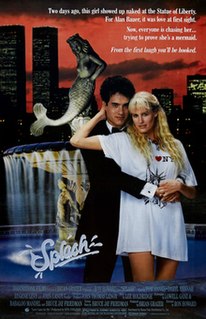
Splash is a 1984 American fantasy romantic comedy film directed by Ron Howard, written by Lowell Ganz and Babaloo Mandel, and starring Tom Hanks, Daryl Hannah, John Candy, and Eugene Levy. It involves a young man who falls in love with a mysterious woman who is secretly a mermaid. It was nominated for an Academy Award for Best Original Screenplay.
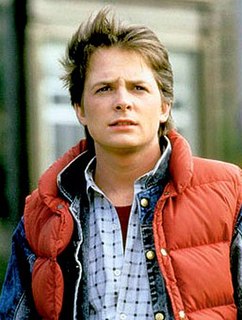
Martin Seamus McFly is a fictional character and the protagonist of the Back to the Future trilogy. He is portrayed by actor Michael J. Fox. McFly also appears in the animated series, where he was voiced by David Kaufman. In the videogame by Telltale Games, he is voiced by A. J. Locascio; in addition, Fox voiced McFly's future counterparts at the end of the game. In 2019, McFly was selected by Empire magazine as the 12th Greatest Movie Character of All Time. In the 2017's series Future Man, Josh Hutcherson plays a character based on Marty McFly as an extended, loser version of himself.
Critical mass is the amount of fissile material needed to sustain nuclear fission.

The Coming of the Quantum Cats is a 1986 science fiction novel by American writer Frederik Pohl. It was originally serialized in Analog science-fiction magazine, January–April 1986.

Freddy's Dead: The Final Nightmare is a 1991 American slasher film and the sixth installment in the Nightmare on Elm Street series. The film is the sequel to A Nightmare on Elm Street 5: The Dream Child and was originally intended to be the final installment of the series; Wes Craven's New Nightmare was released three years later but takes place outside the series canon. A canonical sequel, Freddy vs. Jason, was released in 2003. This was New Line Cinema's first 3D film release.
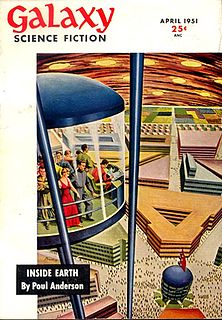
"The Marching Morons" is a science fiction story by American writer Cyril M. Kornbluth, originally published in Galaxy in April 1951. It was included in The Science Fiction Hall of Fame, Volume Two after being voted one of the best novellas up to 1965.
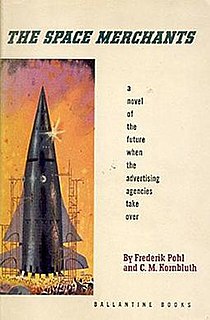
The Space Merchants is a 1952 science fiction novel by American writers Frederik Pohl and Cyril M. Kornbluth. Originally published in Galaxy Science Fiction magazine as a serial entitled Gravy Planet, the novel was first published as a single volume in 1953, and has sold heavily since. It deals satirically with a hyper-developed consumerism, seen through the eyes of an advertising executive. In 1984, Pohl published a sequel, The Merchants' War. In 2012, it was included in the Library of America omnibus American Science Fiction: Four Classic Novels 1953–1956. Pohl revised the original novel in 2011 with added material and more contemporary references.
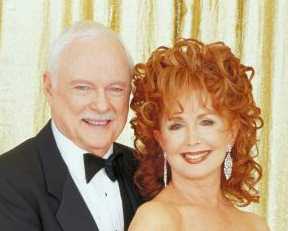
Mickey Horton is a fictional character from the soap opera Days of Our Lives, played from the show's debut episode in 1965 until January 2004 by John Clarke. The role was briefly played in 2004 by Richard Voigts, and later played by John Ingle from 2004 through 2006. Kevin Dobson appeared as Mickey in the character's final appearances in 2008.

Maggie Horton is a fictional character from Days of Our Lives, an American soap opera on the NBC network. She has been portrayed by actress Suzanne Rogers since 1973, though she left the show briefly in 1984 and 2003. She was created by scriptwriter William J. Bell and producer Betty Corday, as a romantic interest for original character Mickey Horton. Maggie, however, would become a much bigger part of the show in later years.

Super Science Stories was an American pulp science fiction magazine published by Popular Publications from 1940 to 1943, and again from 1949 to 1951. Popular launched it under their Fictioneers imprint, which they used for magazines, paying writers less than one cent per word. Frederik Pohl was hired in late 1939, at 19 years old, to edit the magazine; he also edited Astonishing Stories, a companion science fiction publication. Pohl left in mid-1941 and Super Science Stories was given to Alden H. Norton to edit; a few months later Norton rehired Pohl as an assistant. Popular gave Pohl a very low budget, so most manuscripts submitted to Super Science Stories had already been rejected by the higher-paying magazines. This made it difficult to acquire good fiction, but Pohl was able to acquire stories for the early issues from the Futurians, a group of young science fiction fans and aspiring writers.

The Merchants' War is a 1984 satirical science fiction novel by American writer Frederik Pohl. Set in a near future commercial dystopian interplanetary society, the novel was a sequel to The Space Merchants, and was originally co-published with it as Venus, Inc. Pohl's collaborator in the first novel, C.M. Kornbluth, died in 1958, and so did not contribute to this sequel.

The Wonder Effect is a collection of science fiction stories by American writers Frederik Pohl and Cyril M. Kornbluth, published by Ballantine Books in 1962.

Driver: Renegade is a video game developed by Ubisoft and released in 2011 for the Nintendo 3DS. Part of the Driver series, the game serves as a prequel to 2000's Driver 2.
Astonishing Stories was an American pulp science fiction magazine, published by Popular Publications between 1940 and 1943. It was founded under Popular's "Fictioneers" imprint, which paid lower rates than Popular's other magazines. The magazine's first editor was Frederik Pohl, who also edited a companion publication, Super Science Stories. After nine issues Pohl was replaced by Alden H. Norton, who subsequently rehired Pohl as an assistant. The budget for Astonishing was very low, which made it difficult to acquire good fiction, but through his membership in the Futurians, a group of young science fiction fans and aspiring writers, Pohl was able to find material to fill the early issues. The magazine was successful, and Pohl was able to increase his pay rates slightly within a year. He managed to obtain stories by writers who subsequently became very well known, such as Isaac Asimov and Robert Heinlein. After Pohl entered the army in early 1943, wartime paper shortages led Popular to cease publication of Astonishing. The final issue was dated April of that year.

Cosmic Stories and Stirring Science Stories were two American pulp science fiction magazines that published a total of seven issues in 1941 and 1942. Both Cosmic and Stirring were edited by Donald A. Wollheim and launched by the same publisher, appearing in alternate months. Wollheim had no budget at all for fiction, so he solicited stories from his friends among the Futurians, a group of young science fiction fans including James Blish and C. M. Kornbluth. Isaac Asimov contributed a story, but later insisted on payment after hearing that F. Orlin Tremaine, the editor of the competing science fiction magazine Comet, was irate at the idea of a magazine that might "siphon readership from magazines that paid", and thought that authors who contributed should be blacklisted. Kornbluth was the most prolific contributor, under several pseudonyms; one of his stories, "Thirteen O'Clock", published under the pseudonym "Cecil Corwin", was very successful, and helped to make his reputation in the field. The magazines ceased publication in late 1941, but Wollheim was able to find a publisher for one further issue of Stirring Science Stories in March 1942 before war restrictions forced it to close again.

Comet was a pulp magazine which published five issues from December 1940 to July 1941. It was edited by F. Orlin Tremaine, who had edited Astounding Stories, one of the leaders of the science fiction magazine field, for several years in the mid-1930s. Tremaine paid one cent per word, which was higher than some of the competing magazines, but the publisher, H-K Publications, was unable to sustain the magazine while it gained circulation, and it was cancelled after less than a year when Tremaine resigned. Comet published fiction by several well-known and popular writers, including E.E. Smith and Robert Moore Williams. The young Isaac Asimov, visiting Tremaine in Comet's offices, was alarmed when Tremaine asserted that anyone who gave stories to competing magazines for no pay should be blacklisted; Asimov promptly insisted that Donald Wollheim, to whom he had given a free story, should make him a token payment so he could say he had been paid.

















